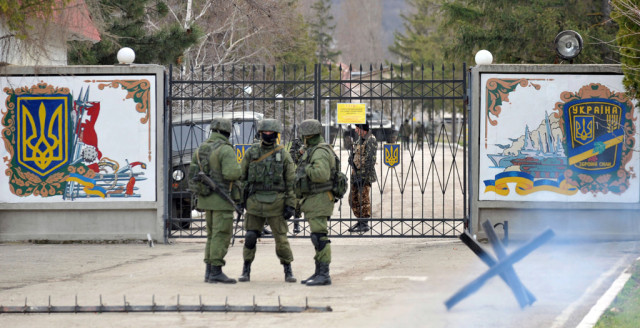Raw nerves as Russian 'occupation' settles on Crimea
Moscow denies the men are Russian troops and the soldiers themselves are tight-lipped.

Ukrainian soldiers (R) stand guard inside their base blocked by Russian troops in Perevalnoye, near Simferopol, on March 6, 2014. PHOTO: AFP
So far, Russia's de facto takeover of Crimea has been surprisingly peaceful, with only a few warning shots fired into the air.
But tensions remain high and residents worry that with so many fingers on triggers, it may not take much to set off real violence.
"For now, life is like normal -- people are working, going to school, shopping," said Lydia Kuzminichna, a 72-year-old running errands in the regional capital Simferopol.
"But of course we are worried, anything can happen. It's a very dangerous situation."
Across the rugged peninsula, armed men in military uniforms and wielding assault rifles have surrounded Ukrainian military installations. Ukrainian authorities say they number in the thousands.
Moscow denies the men are Russian troops and the soldiers themselves are tight-lipped. But with their matching uniforms, sophisticated equipment and professional bearing, there is little doubt they are Russian troops and not rag-tag militia.
Inside the bases, nervous Ukrainian soldiers are standing their ground, refusing to surrender or hand over their weapons, but in most cases clearly not ready to hold off a full-out assault.
"We're just not prepared to face up to the Russian special forces," a captain inside the besieged Belbek base near Sevastopol, Andrei Matchenko, told AFP this week. "This isn't what we are trained or equipped for."
Convoys criss-cross Crimea
Convoys of military transport trucks carrying the Russian forces can be seen criss-crossing the peninsula, which -- linked to the Ukrainian mainland by only the narrow Isthmus of Perekop -- is relatively easy to isolate from the rest of Ukraine.
The Russian forces fanned out across Crimea after pro-Moscow gunmen on February 27 seized key government buildings following the ouster of Ukraine's Moscow-backed president Viktor Yanukovych.
A pro-Russian prime minister was installed and a referendum has been called for March 30 on proclaiming greater autonomy for Crimea.
Moscow's forces have been largely welcomed by Crimea's ethnic Russians, who make up nearly 60 percent of the population and who feared similar unrest to the violence in Kiev last month that left nearly 100 dead.
"If there were no Russian soldiers it would be like Kiev here, exactly the same," said Sergei, a Simferopol resident in his late 30s.
"People started to calm down when the soldiers arrived."
Russian residents said they feared losing out to Crimea's large Ukrainian minority, which accounts for about a quarter of the region's residents, and to the mainly Muslim ethnic Tatars who make up 12-15 percent of the population.
The diverse mix reflects the turbulent history of Crimea, which fell to Russia in the late 18th century when Moscow defeated the Tatars allied with the Ottoman Empire.
The peninsula was the scene of heavy fighting during the 1853-56 Crimean War, mainly remembered in the West for Florence Nightingale, a pioneer of modern nursing, and Britain's suicidal Charge of the Light Brigade against Russian forces.
Crimea remained part of Russia until Soviet leaders handed it to Ukraine in 1954. After the Soviet collapse, Russia was allowed to maintain its Black Sea Fleet at Sevastopol, its home for some 250 years.
Memories of deportation
The Tatars, most of whom seem resolutely set against Crimea re-joining Russia, make the question of the peninsula's future especially difficult.
Their presence is impossible to ignore -- the Muslim call to prayer echoes through Simferopol five times a day from the Kebir-Jami Mosque, built in 1508 and the oldest building in the city.
"This is a difficult time for us," 76-year-old Fevzi Yakubov, a prominent Tatar and rector of Crimea's engineering university, said outside the mosque.
"We are Ukrainians and we are patriots of our homeland."
For many in the community, the Russian troops have revived painful memories of the mass deportation of the Crimean Tatars to Siberia and Central Asia by Stalin in 1944.
Yakubov, seven at the time, was among those deported and did not return from Uzbekistan until he was in his mid-50s.
"There are of course fears of these things happening again. But it was a long time ago and the world is too open now for that," he said.
"We must find a way to calm this down," he said. "Thankfully no one was been killed or wounded yet. We need to work together to make sure this does not get worse."



















COMMENTS
Comments are moderated and generally will be posted if they are on-topic and not abusive.
For more information, please see our Comments FAQ